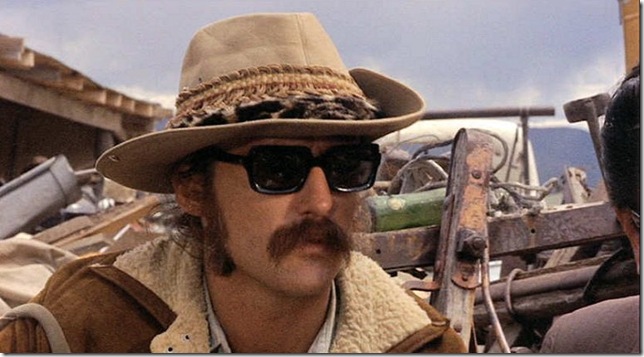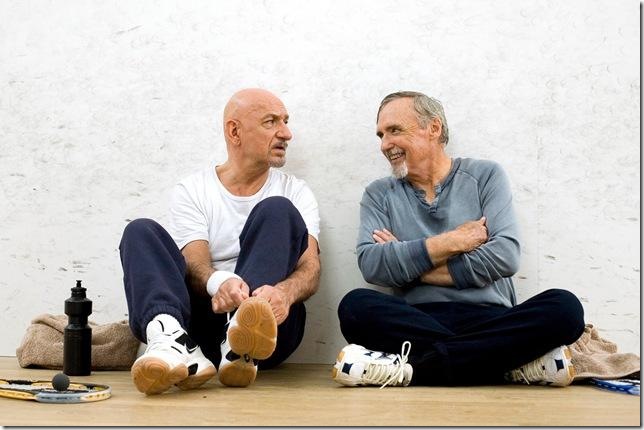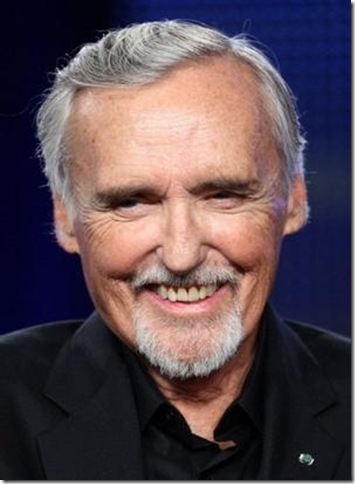I was in college when I first came under the influence of Dennis Hopper, going with my roommate and fellow counterculture rebel wannabe to see a movie called Easy Rider, which Hopper wrote, directed and appeared in.
It was a call to all of us closet revolutionaries to leave our humdrum lives behind and hit the open road, preferably on a souped-up motorcycle. It was an infectious fantasy and a stirring film that I would be afraid to see again today, for it could never be as good as my memory has made it.
Hopper died today of prostate cancer at age 74, leaving behind a handful of first-rate films (Blue Velvet, Hoosiers, Apocalypse Now, Elegy), a few that would be unwatchable without his performances (Waterworld, Super Mario Brothers) and more than 100 others that were variously undistinguished.
By his own admission, Hopper never fully lived up to the promise of Easy Rider. As he said to me when he came to the Palm Beach International Film Festival in 2006 with another of those mediocre releases, 10 & Wolf, “I’m not sure that there’s a meaningful body of work there, but certainly not the kind of body of work that I wanted to leave.” The irony, of course, is that the festival had lured Hopper to South Florida to accept a career achievement award.
Much of his career output was thwarted by years of drug and alcohol abuse that led to Hopper being committed to a psychiatric hospital, sense memories of which crept into some of his recent performances. Still, he told me with unusual honesty, “I feel that after ‘Easy Rider’ I never directed the great movie that I wanted to direct. I never really played the great role that I wanted to play. They didn’t happen, in my opinion.”
Not by 2006, perhaps, but two years later, he gave a performance in Elegy, the screen adaptation of Philip Roth’s short novel The Dying Animal that shows the virtuoso actor he could be. He played the best friend and fellow academic of Ben Kingsley, two lecherous old men who meet for morning coffee, a brilliantly underplayed role that certainly deserved an Oscar nomination at the very least. Chances are you have not seen Elegy, which was underappreciated and under-distributed, but is worth seeking out.
(Yes, I know the Academy Awards get it wrong too often to use that as a measure of an actor’s skill. It is worth noting that Hopper played the snarling villian in Speed, the movie that brought Sandra Bullock to prominence. Now she has an Oscar, and a real actor like Hopper does not. I’m just saying …)
From our 2006 interview, Hopper commented on some of his cinematic career high points:
* Easy Rider: “I wanted to leave a time capsule of what was happening at the time. I never thought about directing when I was in the theater, but I got into the movies and there was somebody telling me every line, to do it differently. I realized the director was really an important guy.”
* Blue Velvet: “That was one of my first roles coming back out of rehab and detox. I finally got sober and it was a terrific experience.”
* Apocalypse Now: “It was unbelievably arduous, but a great creative experience.”
* Waterworld: “One of the best vacations I’ve ever had. It didn’t do well in the United States because everyone shot themselves in the foot talking about ‘the most expensive movie ever made.’ ”
When we spoke, Hopper was a month away from turning 70, a milestone that he could not quite fathom. “It seems ridiculous,” he said. “I was the one who said I didn’t think I’d live to see 30.” He scoffed at the notion of retirement. “I don’t think acting or painting or taking photographs — the kind of stuff I do — that one day you just stop because you’re too old. You continue doing them as long as you can physically do them, and I’m feeling pretty good physically.”


